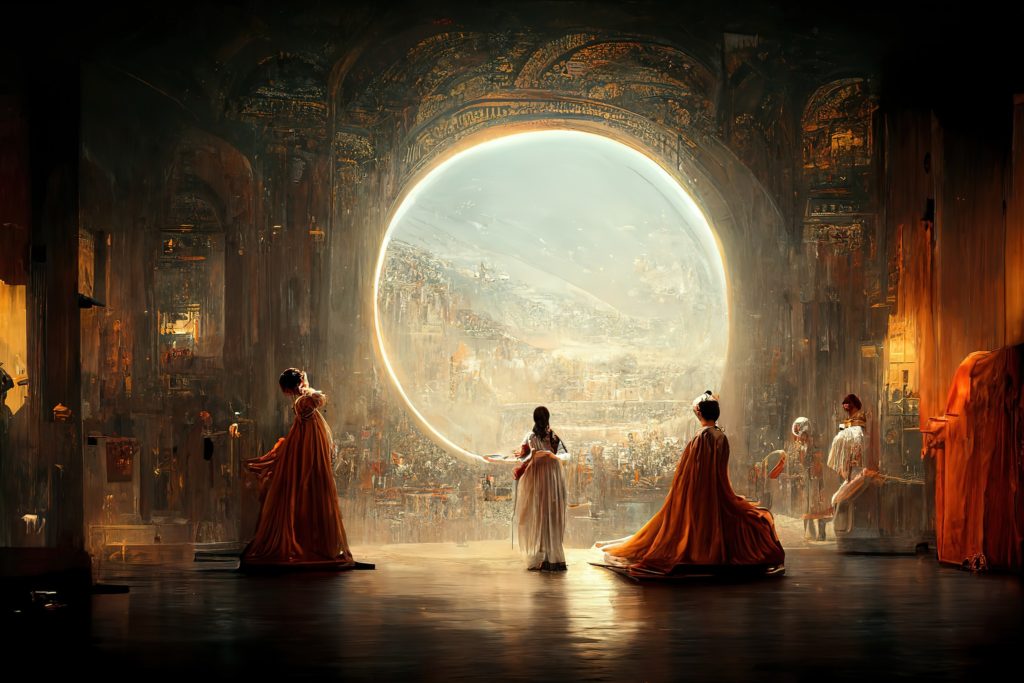Share the post "AI Takes the Art World by Storm: Exclusive Interview with the Mastermind Behind U.S. Competition-Winning Work, Jason M. Allen"
“I enjoy creating from my imagination and when I find that people love my ideas it is truly fulfilling”.
These are the words of artist Jason M. Allen who sum up his artistic approach and recently took first place winning the $ 300 prize at the Colorado State Fair Fine Arts Competition 2022 in the category Digital Art / Digitally Manipulated Photography, with the work Théâtre D’opéra Spatial. The work was generated thanks to the artificial intelligence of the Midjourney application based on machine learning, and this very aspect has caused some controversy in the art sector, opening debates on what art actually is, who the artist is, who is the copyright, and its actual value.
But before tackling these topics in this long exclusive interview for MUSEUMWEEK MAGAZINE, besides being a digital artist, who is Jason M. Allen?
Let’s begin!
You are President of the Incarnate Games company that produces board games, why did you choose to make your debut in the art world as well?
In addition, I am also the lead game designer and art director at Incarnate Games. I’m also a creative writer. I dream up these fantastical stories and a lot of world-building goes into them. This serves as a foundation within which games can be created, such as Ascended Kings. I design the characters, their relationships, and their backstories, I describe what they look like.
Essentially every aspect of my games is conceived and directed by me, from the names of the characters to the conceptualization and direction of illustrations and color choices, all the way to the graphic design and logotypes. I hire artists and explain to them in intricate detail what I would want, and we would then work together to bring the ideas into reality. So these ideas of mine are being made manifest, as though we make the idea incarnate, to bring it into the world in a physical form. I am following this same pattern, now with a new AI company, Art Incarnate.

I can now use AI to express these creative ideas and bring my vision into form. Bringing vision into form in my opinion is the literal definition of art. I wouldn’t say it is necessarily me “entering into the art world” I would say it is more accurately me “bringing my ideas into the real world”. I love sharing an idea, a story, or a vision with other people and nothing is more satisfying than when another person enjoys your ideas and finds them desirable.
How is your work conceived?
I have a very vivid imagination. I also dream a lot, almost every night. I can remember my dreams long enough to write them down. I don’t always write down my dreams. I also like to daydream, a lot. I am a creative person. So I like to dream up cool things or fantastical ideas. With AI I can create a log of my creative thoughts, I call it an imagination station. It’s like rapid prototyping but in an almost ceaseless stream of creative expression. You get instant results and can iterate quickly. It allows me to dream faster, and imagine more things, more quickly. It’s very addicting. Sometimes a particular idea stands out, and I explore it more.
I discovered a very compelling subject when I started exploring the idea of women in Victorian dresses wearing space helmets. I was in a hypnagogic state, that sleepy sort of dreamy moment right before you fall asleep. I have a very active dream life, it’s like a whole production a lot of times. Anyway, as a result of this, Space Opera Theater was born. I am still working on that project, I love it.
What techniques do you use in general?
As far as techniques go, I don’t share my prompts because there is simply no advantageous reason to. I find it curious that artists will criticize me for not wanting to share my prompt. They will express that part of the joy of artmaking is sharing the process, and say that I should share my prompt for that reason. So it seems they clearly can recognize that there is a creative process to designing prompts and producing A.I. art. Of course, if the prompt wasn’t valuable, then nobody would be interested to discover what it is.
I also feel like revealing the prompt would take the emphasis away from the final work, i.e. the presentation of the piece, and bring more focus to the method I used to create the piece, which I feel loses sight of the point. Also, it is comparable to revealing the secret of a magic trick, it loses the intended effect if you understand how the magic was made, and it ceases to be magical. I am not saying that would happen with my prompts, I am just using it as a comparison because it is not expected of a magician to reveal his methods.
